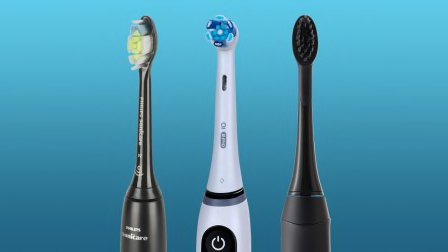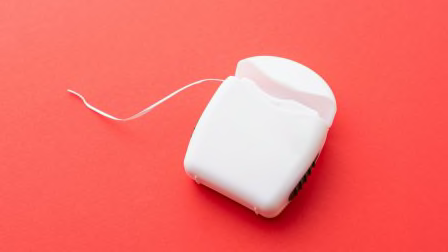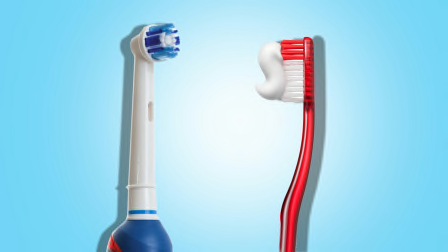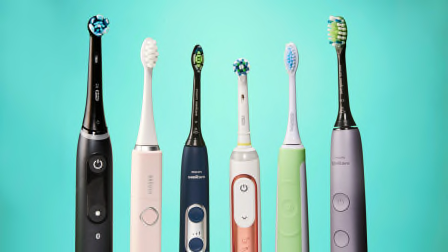Your Guide to Better Dental Health as You Age
Toothache? Bleeding gums? No insurance coverage? Here's what to do.
When you shop through retailer links on our site, we may earn affiliate commissions. 100% of the fees we collect are used to support our nonprofit mission. Learn more.
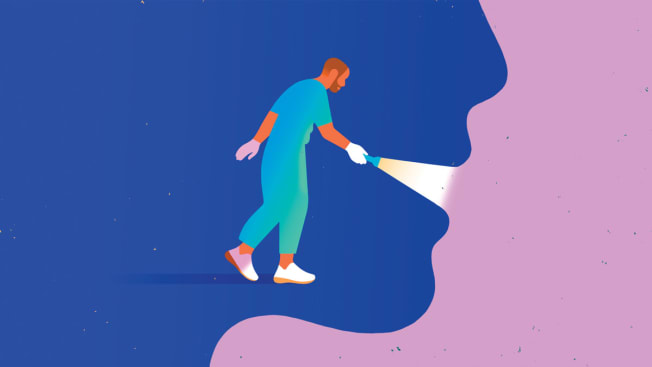
If you’re 65 or older, you’re probably no stranger to dental problems such as cavities and receding gums. About 20 percent of people in this age group have untreated tooth decay, and more than two-thirds have full-blown gum disease, according to the Centers for Disease Control and Prevention.
“Older teeth are more brittle, which makes them more prone to fracture and wear and tear,” says Olivia Sheridan, DMD, a professor of clinical preventive and restorative sciences at the school of dental medicine at the University of Pennsylvania. Illnesses that are more common with age, like type 2 diabetes, may also play a role.
While dental problems can certainly cause pain, they can have other negative effects as well. Loose or missing teeth can make it more difficult to chew, especially foods such as produce with a hard consistency, says Athanasios Zavras, DDS, chair of the department of public health and community service at the Tufts University School of Dental Medicine in Boston.
Dental issues may even harm your heart. A study in the Journal of Periodontology in 2021, for example, found that people with gum inflammation were more likely to have inflammation in their arteries, which raises vascular disease risk. “Gum disease creates gum pockets where anaerobic bacteria can thrive and travel to vulnerable sites in your body, such as your heart,” Zavras says.
All of this makes getting good dental care important as we age. But that can be challenging. Traditional Medicare doesn’t cover most dental services (though some Medicare Advantage plans offer some coverage). Here, experts weigh in on how to handle three common dental problems, including what you can do and what you need a dentist’s help with.
When You Have a Toothache
Cavities—which occur when bacteria from tooth plaque change food sugars and starch into acid that eats away at tooth enamel—are one of the most common causes of dental discomfort.
For Puffy, Bleeding Gums
Gum (or periodontal) disease is an infection of the tissue that surrounds and supports your teeth and is a major cause of tooth loss in adults. It’s caused by plaque, the sticky film of bacteria that forms on your teeth. A less robust immune system hikes the risk of gum disease, Cram says, but difficulty brushing and flossing, dry mouth, and not keeping up with dental visits for cleanings can also have an effect.
The best steps: To prevent swollen, bleeding gums, make sure you’re vigilant about brushing. But remember to go easy: Too much pressure can lead to more gum recession. And floss as advised below. Older adults who floss regularly have a lower risk of gum disease, according to a 2020 study published in the Journal of Dental Research.
“It helps remove bacteria and food that are caught between the teeth that can cause gum inflammation,” says Tomas Ballesteros, DMD, a professor of dentistry at the Rutgers School of Dental Medicine. If a problem such as wrist arthritis makes flossing difficult, try a water flosser, a device that aims a stream of water between your teeth.
For existing gum problems, you might need treatment to prevent tooth loss in addition to good dental hygiene. For mild disease, a dentist will typically perform a deep cleaning called scaling and root planing. This generally takes more than one visit and often requires local anesthesia. More extensive gum disease might require surgery to remove damaged bone and stubborn bacteria.
If Your Mouth Is Always Dry
With age, your mouth produces less saliva, Cram says. This can lead to a condition known as dry mouth, which affects 30 percent of people over the age of 65 and 40 percent of those over 80, according to the ADA—and can raise the risk of cavities and gum disease. Certain medications can worsen the problem as well. Sometimes dry mouth is accompanied by a burning or tingling sensation (called burning mouth syndrome), which may be due to a vitamin B or iron deficiency, according to Cram.
The best steps: The first and easiest thing to do is to stay well hydrated, Hewlett says. “Keep a bottle of water with you all the time, and sip on it frequently to keep your mouth moist and wet and hydrated,” he says. Other drinks with no added sugar, like milk or herbal tea, are also fine, but alcohol and caffeine can dry out your mouth. If needed, the ADA recommends that you suck on ice chips.
Chewing on sugar-free gum or sucking on sugar-free candy that contains xylitol has been found to help ease the condition, Sheridan says. Talk to your doctor if you think your dry mouth may be related to medication, and see if you can switch to another drug. For burning mouth, you may want your primary care provider to check your iron and vitamin B levels, Cram says. If you’re deficient, they may recommend a supplement.
A Smart Dental Routine
You already know it’s important to floss daily and brush your teeth gently with a fluoride toothpaste at least twice a day for 2 minutes at a time.
But which toothbrush is best? While a manual one can do a fine job, you might want to consider an electric toothbrush, says Tomas Ballesteros, DMD. A 2019 study in the Journal of Clinical Periodontology found that using one led to 22 percent less gum recession (a risk factor for gum disease) and 18 percent less tooth decay.
See your dentist regularly. There’s no hard and fast rule; it varies from person to person, but “at the very least it should be once a year,” says Edmond Hewlett, DDS. As you age and dental risk factors increase, it’s likely your dentist will advise a professional cleaning at least twice a year.
Find Care at a Good Price
Almost half of people on Medicare have no dental insurance coverage. These options may help.
• Consider a dental-school clinic. You’ll be seen by a student who’s supervised by an attending dentist, a good way to get high-quality but low-cost care, Hewlett says. Search for one through the American Dental Education Association.
• Become a “member.” In about a quarter of dental offices, you can receive preventive care like cleanings at no charge and more complicated procedures at a reduced cost in return for membership fees (which vary). Ask at local practices.
• Look into dental discount plans. These let you access a network of dentists who offer discounts, with savings of up to 60 percent. Search at DentalPlans.com.
• Check for special benefits. Veterans may qualify for dental coverage. Medicaid offers some dental coverage in many states. And some community health centers provide free or reduced-cost dental services. State dental associations may also point you to lower-cost care.
Editor’s Note: A version of this article also appeared in the November 2023 issue of Consumer Reports On Health.

















